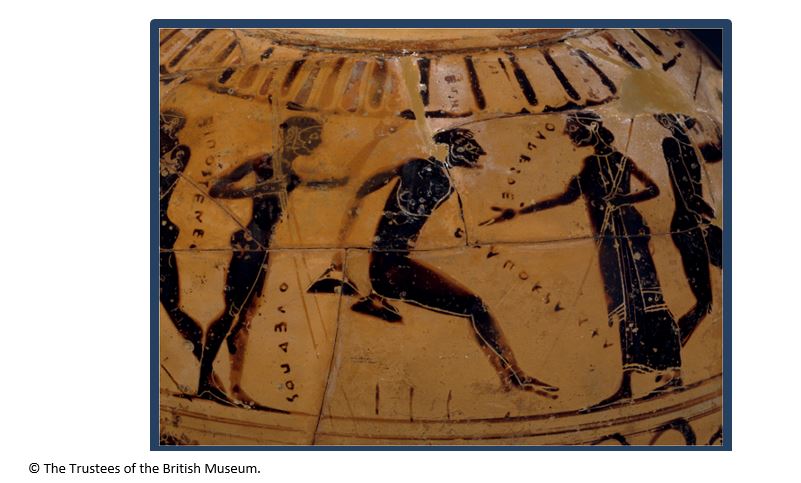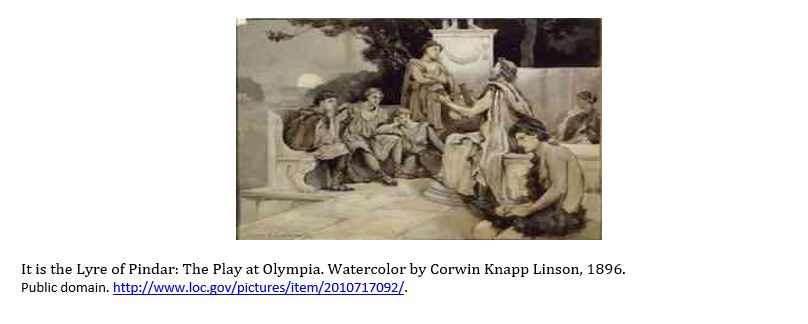6th Grade Olympics Inquiry
Are the Olympics About More than Sports?
Download the Entire Inquiry Here

Staging the Compelling Question
The compelling question “Are the Olympics about more than sports?” may be staged by having students discuss the pros and cons of school sports as they relate to uniting people. Students may focus on Olympic sports, such as track and field, or non-Olympic sports, such as baseball or football. Students may also discuss occasions when athletic rivals look past their differences to cooperate through sports and related activities.
Are the Olympics About More than Sports?
Download the Entire Inquiry Here
Staging the Compelling Question
The compelling question “Are the Olympics about more than sports?” may be staged by having students discuss the pros and cons of school sports as they relate to uniting people. Students may focus on Olympic sports, such as track and field, or non-Olympic sports, such as baseball or football. Students may also discuss occasions when athletic rivals look past their differences to cooperate through sports and related activities.
Supporting Question 1- What is the history and mythology of the ancient Greek Olympics?
The first supporting question—“What is the history and mythology of ancient Greek Olympics?”—invites students to focus on the origins of the Olympic Games in eighth-century BCE Greece. The games continued for 500 years as they came to be one of the most important traditions in Greek culture. The formative performance task calls on students to list 10 people, places, or events related to the history of the ancient Greek Olympics. The featured sources include an image bank with text that offers a short history of the Olympics and two 2,000-year-old descriptions of the history and mythology of the Olympics from Pausanias of Damascus.
Supporting Question 3- How are the arts a part of the modern Olympics?
The third supporting question—“How are the arts a part of the modern Olympics?”—provides students with an opportunity to examine how Olympism is expressed through the arts. In the formative performance task, students make a claim about the importance of arts in the Olympic movement. The two featured sources provide students with an opportunity to compare the incorporation of the arts in the ancient and modern Olympics.

- Source A: Image bank: Ancient Olympic games
- Source B: "The Olympic Games, History," excerpt from Description of Greece
- Source C: International Olympic Committee, “What Is Olympism,” excerpt from the report Olympism and the Olympic Movement, 2012
Supporting Question 2- What are the goals of the modern Olympic Movement?
- Source A: Excerpt from Official Report of the Games of the First Olympiad
- Source B: Video: Living the Olympic Values
- Source C: "What is Olympism?" excerpt from Olympism and the Olympic Movement
Supporting Question 3- How are the arts a part of the modern Olympics?
The third supporting question—“How are the arts a part of the modern Olympics?”—provides students with an opportunity to examine how Olympism is expressed through the arts. In the formative performance task, students make a claim about the importance of arts in the Olympic movement. The two featured sources provide students with an opportunity to compare the incorporation of the arts in the ancient and modern Olympics.
- Source A: Peter Armenti, an image and blog post about the poetry of Pindar and the Olympics, “Pindar, Poetry, and the Olympics” (excerpt), From the Catbird Seat: Poetry & Literature at the Library of Congress blog, July 27, 2012
Pindar, Poetry, and the Olympics by Peter Armenti
The relationship between poetry and the Olympics reaches back at least 2,500 years, when the Greek poet Pindar (ca. 518-438 B.C.) composed victory odes, or epinicia, for victorious athletes competing in the Olympics and the three other major Panhellenic games—those at Pythia, Nemea, and the isthmus of Corinth. Of these, the Olympic games were the most important, as Pindar recognizes in his first Olympian ode, written to celebrate the victory of the racehorse Pherenikos, owned by Hieron, ruler of Syracuse:
But if, my heart, you wish to sing of contests, look no further for any star warmer than the sun, shining by day through the lonely sky, and let us not proclaim any contest greater than Olympia….
(prose tr. Diane Arnson Svarlien)
While only fourteen of Pindar’s Olympic odes survive—they can be read online in Greek and in various English translations—his influence, and the larger influence of poetry on the Olympics, has lasted. In fact, the push to revive the Olympics was initiated by Greek poet Panagiotis Soutsos, who first raised the prospect in his 1833 poem “Dialogue of the Dead,” in which the ghost of Plato says to a Greece suffering through economic and political hardship:
If our shadow could fly to your earth it would daringly shout to the Ministers of the Throne:
Leave your petty politics and vain quarrels.
Recall the past splendour of Greece.
Tell me, where are your ancient centuries?
Where are your Olympic Games?....
Public domain. Library of Congress. http://blogs.loc.gov/catbird/2012/07/pindar-poetry-and-the-olympics/.
The relationship between poetry and the Olympics reaches back at least 2,500 years, when the Greek poet Pindar (ca. 518-438 B.C.) composed victory odes, or epinicia, for victorious athletes competing in the Olympics and the three other major Panhellenic games—those at Pythia, Nemea, and the isthmus of Corinth. Of these, the Olympic games were the most important, as Pindar recognizes in his first Olympian ode, written to celebrate the victory of the racehorse Pherenikos, owned by Hieron, ruler of Syracuse:
But if, my heart, you wish to sing of contests, look no further for any star warmer than the sun, shining by day through the lonely sky, and let us not proclaim any contest greater than Olympia….
(prose tr. Diane Arnson Svarlien)
While only fourteen of Pindar’s Olympic odes survive—they can be read online in Greek and in various English translations—his influence, and the larger influence of poetry on the Olympics, has lasted. In fact, the push to revive the Olympics was initiated by Greek poet Panagiotis Soutsos, who first raised the prospect in his 1833 poem “Dialogue of the Dead,” in which the ghost of Plato says to a Greece suffering through economic and political hardship:
If our shadow could fly to your earth it would daringly shout to the Ministers of the Throne:
Leave your petty politics and vain quarrels.
Recall the past splendour of Greece.
Tell me, where are your ancient centuries?
Where are your Olympic Games?....
Public domain. Library of Congress. http://blogs.loc.gov/catbird/2012/07/pindar-poetry-and-the-olympics/.
- Source B: Norbert Muller, article about Pierre de Coubertin’s desire to include the arts in the modern Olympics, “Inviting the Artists: Paris 1906” (excerpt), One Hundred Years of Olympic Congresses, 1894-1994: History, Objectives, Achievements, 1994
-
Paris 1906
Norbert Müller
Fourth Olympic Congress (Advisory Conference)
Paris, Comédie Française and Touring Club, May 23-25, 1906In 1906, Coubertin drew the Olympic movement’s attention to the relationship between the Olympic Games and the arts. From the beginning, this was one of his basic aspects of his Olympic idea.1 Arts and Olympism
At the start of the Olympic movement, Coubertin did not stress this aspect explicitly because “the first necessity was to revive them and the second to shape them.”
The Congresses of Le Havre and Brussels connected the Olympic movement to science, and the integration of art was to come. According to Coubertin’s view, Olympic Games should comprise elements which led them beyond international championships and demonstrated their spiritual content, thus coming closer to the ancient ideal. In 1904, he explained:
“Now the moment has come when we enter a new phase and intend to reestablish the original beauty of Olympic Games. In the high times of Olympia…the fine arts were combined harmoniously with the Olympic Games to create their glory. This is to become reality once again.“
…The most essential decision of the Conference referred to the introduction of five competitions of the fine arts in the genres of architecture, sculpting, painting, literature, and music at future Olympic Games. The competitions should be set on an equal footing with sports competitions and should be inspired by the spirit of sport. An international jury was to be responsible for the prize awards, and awarded works were to be exhibited or performed during the Olympic Games…
- As to architecture it was stated that stadia and sports halls could fulfill their purpose only as an entity…A group of architects pursued the draft of a model for a rural gymnasium. The Conference was convinced that the ancient stadium could no longer have any exemplary character for modem sports facilities.
- As to theatre, playwrights should allow sport to inspire them... Sports clubs in turn could engage in amateur dramatics.
- As to dance, it was demanded that it returned to a more athletic way of expression.
- As to the decoration of sports events, the clothing the participants wear in parades should reflect their individual disciplines.
- Literature could deal with topics of sport. It was recommended that authors should experience sport themselves to write authentically about it.
- In contrast to literature, music could support sport by the singing of choirs. The IOC was to encourage sports federations in this respect. Related to this, it was stated that “singing was as important for training the technique of breathing as it was for the majority of sports.” This statement was a sign of the desperate efforts made by the Conference participants to prove a link between sport and arts. The suggestion that sports clubs and choirs should support each other in their festivities was much more sensible.
- As to painting and sculpting, it was recommended that artists create motifs in the modern sports halls wherein other opportunities should be given for artists to exhibit their works.
© 1994 --TM International Olympic Committee / Professeur Dr Norbert Müller – All rights reserved.
| New York State Social Studies Framework Key Idea & Practices | 6.5 COMPARATIVE CLASSICAL CIVILIZATIONS IN THE EASTERN HEMISPHERE (ca. 600 B.C.E.–ca. 500 C.E.): As complex societies and civilizations change over time, their political and economic structures also evolve. A golden age may be indicated when there is an extended period of time that is peaceful and prosperous and demonstrates great cultural achievements. Gathering, Using, and Interpreting Evidence Comparison and Contextualization Conceptual Understaning (6.5c) A period of peace, prosperity, and cultural achievements may be indicative of a golden age |
| Staging the Question | Discuss the pros and cons of school sports as they relate to uniting people. |